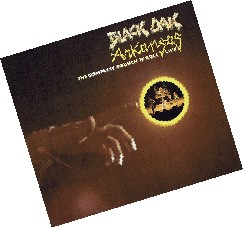Formed nearly 40 years ago in the small Arkansas town of Black Oak and now based in Memphis, the story of Black Oak Arkansas stands as one of the most compelling tales in regional rock history.
This year, the band’s profile is on the rise, spurred in part by the recent release of The Complete Raunch ‘N’ Roll Live on the Rhino Handmade label. The reissue of the band’s perfectly titled 1973 live set Raunch ‘N’ Roll Live has been expanded to a double CD to include a similar live set from Seattle to go with the original Portland show.
During the first part of the ’70s, Black Oak Arkansas was a wildly popular touring band and Southern-rock entity with no immediate sonic contemporaries. Some fans of the genre view them as an acquired taste, and there are a couple of reasons why. First, the fluid grooves of the Allman Brothers or the Marshall Tucker Band are not the building blocks of the Black Oak Arkansas sound (though many of the extended three-guitar excursions on R ‘N’ R can hold their own). Rather, Black Oak Arkansas was a feral, stomping, unhinged animal in the developing world of early-’70s Southern rock, owing as much to ragged Delta blues and primal mid-’60s garage rock as they did any jam-oriented contemporaries.
Black Oak Arkansas was also an anomaly among successful ’70s bands for another reason. Other than a minor hit with a cover of Laverne Baker’s “Jim Dandy to the Rescue,” the band made no impact on the charts. Black Oak Arkansas’ large discography (13 albums between 1971 and 1980) and their hundreds of thousands of fans were made possible through incessant touring. A reliably heavy draw, bands like Black Sabbath and Emerson, Lake, & Palmer used to open for Black Oak. The live footage that dominates the fascinating documentary Black Oak Arkansas: The First 30 Years (2003, Rhino/Warners) shows stadium after stadium full of dedicated fans (including Bill and  Justin Fox Burks
Justin Fox Burks
Hillary Clinton at a mid-’70s concert!) held rapt by kit-destroying drum solos, harmonious guitar jams, and the wild-ass washboard-abusing antics of frontman Jim Dandy.
The band fractured in the late ’70s for myriad reasons, including some shady management dealings. Dandy put together several lineups of the band throughout the ’80s, released some solo material, and, well, kept at it. Based in Memphis for some years now, Dandy’s current right-hand man is original guitarist and co-founder Rickie Reynolds, and the drums are being handled by Johnny Bolin, brother of late guitar legend Tommy Bolin.
When I recently spoke with Dandy, he was preparing to depart for Sweden, where Black Oak Arkansas were prominently featured in the Sweden Rock Festival alongside Motörhead, Ted Nugent, and the Scorpions. But he took time to discuss a new studio album and growing up in rural Arkansas.
Flyer: So, Black Oak Arkansas has a new studio album coming out?

Jim Dandy: Yeah, I recently finished recording it myself. It’s supposed to come out in August, and it will probably be on the SPV label. If there’s one thing I can do better than what I do on stage, it’s campaign for record deals.
Black Oak Arkansas was a massively popular touring act in the early-to-mid ’70s. How did you achieve this without radio airplay?
During our first three years of existence, we toured 300 days out of 365, and we thrived in Europe because of how music journalism is so different over there. Everywhere, the word spread. Kids heard about us. We were sort of a mythical thing, this being before the days of music videos and such.
In that day and age, nobody really moved around much [on stage], and we had an unforgettable show. I felt like the people deserved a sight more than a sound, and I was built for the big stage.
You built a solid and huge fan base.
Yeah, they freaked me out at first. Music writers were calling us “amphetamine buffalos,” but I looked out in the audience and saw these wide-eyed Manson eyes. I looked out in that audience and saw things I’d never seen. I mean, I came from Black Oak, Arkansas!
What were the early days in Arkansas like?
We were the first people in Black Oak to have long hair. We were all high school friends, and people looked at us like we were communists. I was sick of getting beaten up after school every day and asked Ricky Lee [Reynolds], “Hey, can you play three chords?” Then we went to New Orleans for a while. That’s where we did the first album, as Knowbody Else. We were terrible on that record.
How did the Rhino Handmade reissue come about?
Ha, not sure exactly. Raunch ‘N’ Roll was our first gold record. We had definitely hit our stride as a live band, and we had songs on there that had never been on other albums. That’s why I had raps before a lot of the songs, because they were new.
“Heaven” was the name of the compound, back in Black Oak, that housed the band at the height of your popularity. Ads were placed in the back of Creem magazine in which readers could purchase a square foot of the land for a dollar.
We weren’t there all that much, due to touring. And it was basically just a converted fishing resort. That was one of our manager’s bad ideas, another way to have control over us, and the Creem thing was just another moneymaking scheme.

 Justin Fox Burks
Justin Fox Burks 